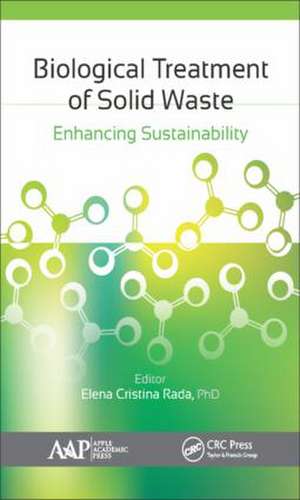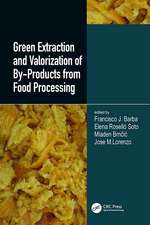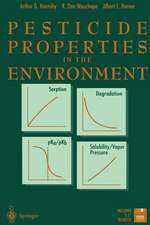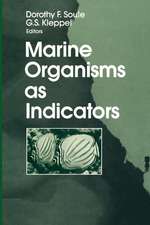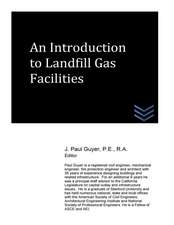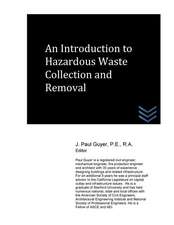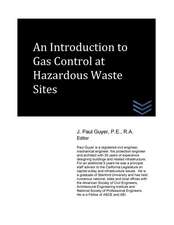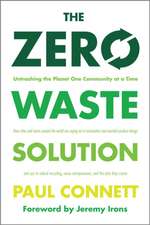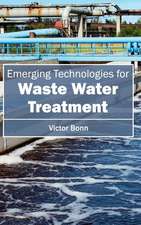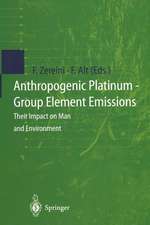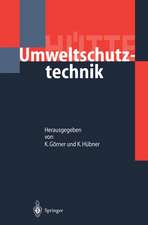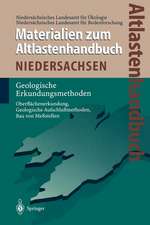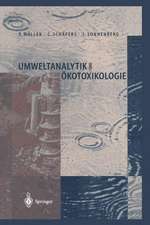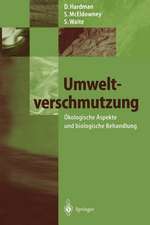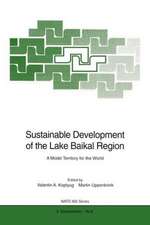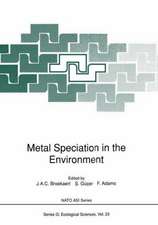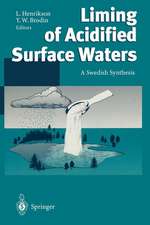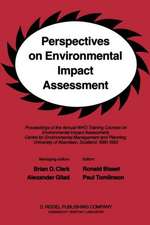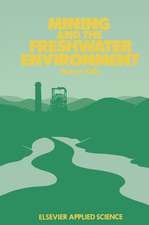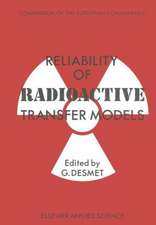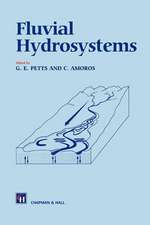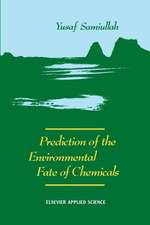Biological Treatment of Solid Waste: Enhancing Sustainability
Editat de Elena C. Radaen Limba Engleză Hardback – 4 sep 2015
Intended for a wide audience ranging from engineers and academics to decision-makers in both the public and private sectors, Biological Treatment of Solid Waste: Enhancing Sustainability reviews several technologies that help communities manage solid waste sustainably, while at the same time generating energy, revenue, and other resources.
The book is divided into three topics:
- Microbial technologies for solid waste treatment
- Composting
- Biodrying
| Toate formatele și edițiile | Preț | Express |
|---|---|---|
| Paperback (1) | 579.62 lei 43-57 zile | |
| Apple Academic Press Inc. – 31 mar 2021 | 579.62 lei 43-57 zile | |
| Hardback (1) | 921.74 lei 43-57 zile | |
| Apple Academic Press Inc. – 4 sep 2015 | 921.74 lei 43-57 zile |
Preț: 921.74 lei
Preț vechi: 1124.08 lei
-18% Nou
Puncte Express: 1383
Preț estimativ în valută:
176.38€ • 184.62$ • 146.80£
176.38€ • 184.62$ • 146.80£
Carte tipărită la comandă
Livrare economică 31 martie-14 aprilie
Preluare comenzi: 021 569.72.76
Specificații
ISBN-13: 9781771882798
ISBN-10: 1771882794
Pagini: 310
Ilustrații: 37 black & white illustrations
Dimensiuni: 152 x 229 x 25 mm
Greutate: 0.54 kg
Ediția:1
Editura: Apple Academic Press Inc.
Colecția Apple Academic Press
ISBN-10: 1771882794
Pagini: 310
Ilustrații: 37 black & white illustrations
Dimensiuni: 152 x 229 x 25 mm
Greutate: 0.54 kg
Ediția:1
Editura: Apple Academic Press Inc.
Colecția Apple Academic Press
Public țintă
Academic and PostgraduateCuprins
Introduction; Microbial Technologies; Management Options of Food Waste: A Review; F. Girotto, L. Alibardi, and R. Cossu; Effect of Increasing Total Solids Contents on Anaerobic Digestion of Food Waste under Mesophilic Conditions: Performance and Microbial Characteristics Analysis; Jing Yi, Bin Dong, Jingwei Jin, and Xiaohu Dai; Microbial Anaerobic Digestion (Bio-Digesters) as an Approach to the Decontamination of Animal Wastes in Pollution Control and the Generation of Renewable Energy; Christy E. Manyi-Loh, Sampson N. Mamphweli, Edson L. Meyer, Anthony I. Okoh, Golden Makaka, and Michael Simon; New Steady-State Microbial Community Compositions and Process Performances in Biogas Reactors Induced by Temperature Disturbances; Gang Luo, Davide De Francisci, Panagiotis G. Kougias, Treu Laura, Xinyu Zhu, and Irini Angelidaki; Composting; Composting of Organic Fraction of Municipal Solid Waste: A Pilot Plant in Maxixe District, Mozambique; C. Collivignarelli, A. Perteghella, and M. Vacchari; Changes in Bacterial and Fungal Communities across Compost Recipes, Preparation Methods, and Composting Times; Deborah A. Neher, Thomas R. Weicht, Scott T. Bates, Jonathan W. Leff, and Noah Fierer; Effects of Bulking Agents, Load Size or Starter Cultures in Kitchen-Waste Composting; Norazlin Abdullah, Nyuk Ling Chin, Mohd Noriznan Mokhtar, and Farah Saleena Taip; Microbial Diversity of Vermicompost Bacteria that Exhibit Useful Agricultural Traits and Waste Management Potential; Jayakumar Pathma and Natarajan Sakthivel; Biodrying; Criteria for Assessing the Viability of a Small Scale MSW Bio-Drying Plant Aimed at RDF Production for Local Use; E. C. Rada and M. Ragazzi; Technical and Economic Efficiency of Utilization of Biogas from Animal Waste for Energy Generation; E. Minciuc, R. Patrascu, M. Norisor, and D. Tutica; Potential of Bio-Drying Applied to Exhausted Grape Marc; Elena Cristina Rada and Marco Ragazzi; Index
Notă biografică
Elena Cristina Rada, PhD, earned her master's degree in environmental engineering from the Politehnica University of Bucharest, Romania; she received a PhD in environmental engineering and a second PhD in power engineering from the University of Trento, Italy, and the Politehnica University of Bucharest. Her post-doc work was in sanitary engineering from the University of Trento, Italy. She has been a professor in the Municipal Solid Waste master’s program at Politehnica University of Bucharest, and has served on the organizing committees of "Energy Valorization of Sewage Sludge," an international conference held in Rovereto, Italy, and Venice 2010, an International Waste Working Group international conference. She also teaches seminars in the bachelor, master, and doctorate modules in the University of Trento and Padua and Politehnica University of Bucharest and has managed university funds at national and international levels. Dr. Rada is a reviewer of international journals, a speaker at many international conferences, and the author or co-author of about 100 research papers. Her research interests are bio mechanical municipal solid waste treatments, biological techniques for biomass characterization, environmental and energy balances regarding municipal solid waste, indoor and outdoor pollution (prevention and remediation) and health, and innovative remediation techniques for contaminated sites and streams.
Descriere
This title includes a number of Open Access chapters.
Intended for a wide audience ranging from engineers and academics to decision-makers in both the public and private sectors, Biological Treatment of Solid Waste: Enhancing Sustainability reviews several technologies that help communities manage solid waste sustainably, while at the same time generating energy, revenue, and other resources. The book is divided into three topics: microbial technologies for solid waste treatment, composting, and biodrying. Included within these larger topics are case studies and investigations into particular aspects of each, with attention paid to food waste, animal waste, municipal waste, and certain forms of industrial waste.
Intended for a wide audience ranging from engineers and academics to decision-makers in both the public and private sectors, Biological Treatment of Solid Waste: Enhancing Sustainability reviews several technologies that help communities manage solid waste sustainably, while at the same time generating energy, revenue, and other resources. The book is divided into three topics: microbial technologies for solid waste treatment, composting, and biodrying. Included within these larger topics are case studies and investigations into particular aspects of each, with attention paid to food waste, animal waste, municipal waste, and certain forms of industrial waste.
